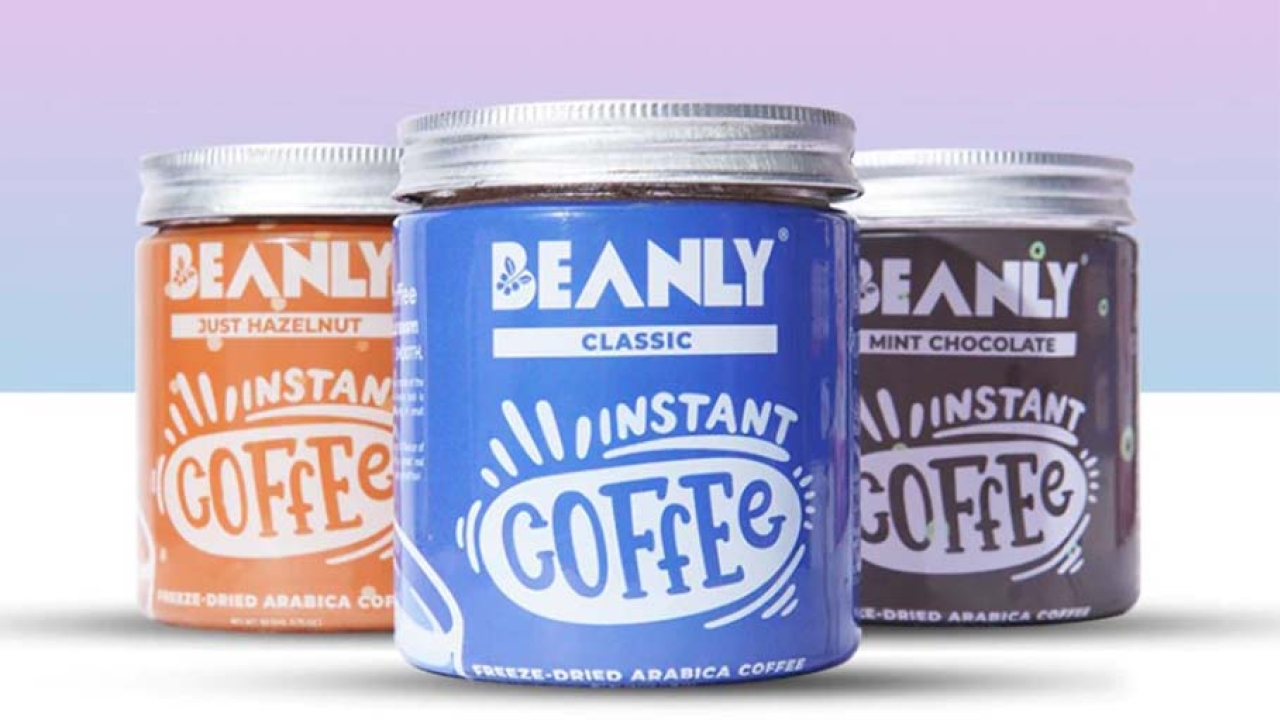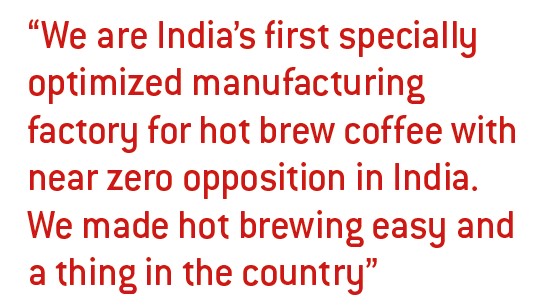Brewing new ideas with Beanly
Coffee start-up Beanly discovered a more flexible way to create new product packaging when it shifted from conventional print technologies to HP Indigo digital printing

Beanly instant coffee jars
Avid coffee lovers and good friends Rahul Jain and Samayesh Khanna quit their nine-to-five jobs to follow their passion and start a coffee business, Beanly, in 2018.
‘We come from very different backgrounds, but what was
common between the two of us, was our love for coffee,’
Khanna says.
‘There were just a few options to have freshly brewed coffee in the Indian market back in the day – buying instant coffee or going to a premium café where it would be expensive,’ he adds.
Beanly introduced hot brew coffee bags for freshly brewed
on-the-go coffee. ‘We were pioneers, back in 2018 and India’s first hot brew specific company.’
Today Beanly has more than 22 SKUs in its product portfolio.
Out of the four product categories that the company offers, Khanna sees a competitive advantage in a few of them.
‘We are still currently India’s first specially optimized
manufacturing factory for hot brew coffee with near zero
[competition] in India. We made hot brewing easy and a thing in the country. A lot of brands have built their products in the category with us, so this was one of the most exciting categories that we started with,’ Khanna explains.
The brand has recently launched nitrogen-infused coffee cans for on-the-go consumers. ‘We are the first ones to be offering Nitro coffee in a can in India, and all these products have been built ground up in India.’
Beanly is preparing to launch at least four to five new SKUs
within the calendar year.
Dedication to innovation
A large part of Beanly’s journey has been dedicated to creating new and unique products. Primarily, it is an online-first brand because this gives the company better and quicker access to consumers. The middleman cost is eliminated.
‘It also helps you get eyeballs faster and cheaper than traditional models,’ Khanna says.
Back when it was established, Beanly was using conventional printing technologies for its labels and packaging. The brand’s labels and packaging require several media including matte BOPP laminate, PET laminate, shrink sleeves and SPF sheets.
‘There was the challenge of media when using conventional
technologies. When you print on different media, the outputs can be very different in terms of color and brand consistency,’ Khanna notes.
This became an obstacle when it came to launching new
products in new packaging formats. With no option to print short runs, the start-up had to wait 30-60 days for its labels.
Gravure required cylinders, which added to the company’s
Capex. ‘In our early journey, we needed to add new variants and when we launched new products it was a big time for us. We were tight on timelines and gravure wouldn’t give quick deliveries,’ Khanna explains.
Flexo took 10-20 days and it limited Beanly in terms of the
number of artwork iterations it could have in the same print run.
The co-founders discovered HP Indigo digital print technology when their label converter ran tests and samples on the press. The brand instantly preferred the digital quality.
With digital printing, the start-up found a considerable advantage of quicker timelines and color consistency across different media.
‘When we were starting, costs and timelines were a constraint which digital solved instantly. As compared to conventional technologies, our product launch timelines were significantly reduced to seven days when we switched to HP Indigo digital technology,’ Khanna highlights.

Launching new products and adding new forms of packaging became easier for Beanly. The co-founders could now create custom packaging for market research as well.
‘The minimum run quantity came down. It was not possible
anywhere else. I am inclined towards digital as a solution for the long run as well, primarily because it has a much lower carbon footprint. We are actively moving into a time where we are bound to be conscious about what we print, consume, and how we operate,’ Khanna adds.
Savings in capital expenditure, which came with the ability
to print short runs were used to increase efficiencies on the
operational side.
Beanly will be launching new products soon and sampling is done on HP Indigo digital press. The full run of nitro coffee can labels are also printed on the HP press.
‘Our costing is still optimized on digital and is my preferred mode of printing.’
The company will soon introduce in-mold labels on its
new products.
‘We haven’t fully utilized HP for brand recognition yet. The larger advantages were faster launch, less Capex, low print runs, quick turnaround time and market testing,’ Khanna concludes.
Stay up to date
Subscribe to the free Label News newsletter and receive the latest content every week. We'll never share your email address.


